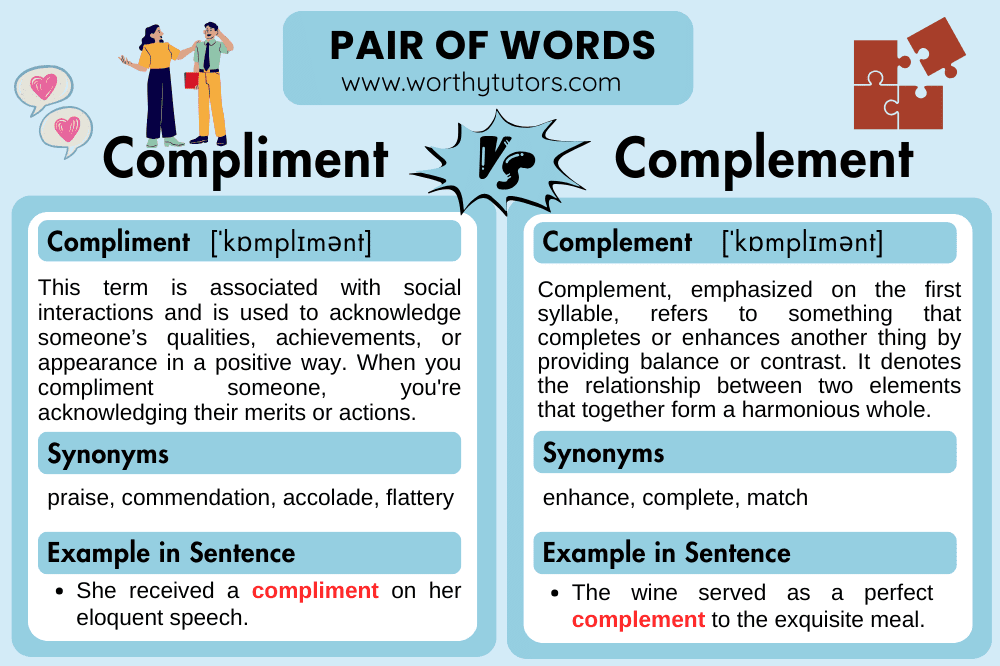
Differences Between “Compliment” and “Complement”
Students often find themselves perplexed by subtle yet significant distinctions among homophones, leading to occasional mix-ups in their usage. The words “compliment” and “complement” are often confused because of their similar pronunciation and spelling. However, they have distinct meanings and uses. This article will clarify these terms by examining their pronunciation, synonyms, meanings, usage, examples, and a conclusion.
Compliment
Pronunciation of Compliment
Compliment: [ˈkɒmplɪmənt]
Meanings of Compliment
A compliment, pronounced with the stress on the second syllable, refers to an expression of praise, admiration, or approval towards someone or something. It is a form of courteous acknowledgment for qualities or actions.
Synonyms of Compliment
Praise, commendation, accolade, flattery
Etymology and Explanation of Compliment
Originating from the Latin word “complimentum,” meaning “fulfillment” or “accomplishment,” the term evolved to connote expressions of praise or admiration in English. This term is associated with social interactions and is used to acknowledge someone’s qualities, achievements, or appearance in a positive way. When you compliment someone, you’re acknowledging their merits or actions in a positive light, often to uplift their spirits or to express gratitude.
Examples of Compliment in Sentences
- She received a compliment on her eloquent speech.
- Giving a sincere compliment can brighten someone’s day.
- He paid her a compliment by noting her excellent work ethic.
- The chef appreciated the compliments to the kitchen after a successful dinner service.
- Sarah blushed with pleasure at the unexpected compliment from her colleague.
Complement
Pronunciation of Complement
Complement: [ˈkɒmplɪmənt]
Meaning of Complement
Complement, emphasized on the first syllable, refers to something that completes or enhances another thing by providing balance or contrast. It denotes the relationship between two elements that together form a harmonious whole.
Etymology and Explanation of Complement
Derived from the Latin word “complementum,” meaning “that which fills up,” the term has retained its essence in English. This term is often used in various contexts, such as design, where one element enhances another, or in grammar, where it completes the meaning of a predpicate. In various contexts, a complement serves to augment or supplement something else, making it more effective or whole.
Synonyms of Complement
Supplement, enhance, complete, match
Examples of Complement in Sentences
- The wine served as a perfect complement to the exquisite meal.
- His skills in finance perfectly complement her expertise in marketing.
- The new curtains were a wonderful complement to the room’s décor.
- The red shoes were a striking complement to her black dress.
Usage of Both Words
- Compliment is used when expressing approval, praise, or admiration towards someone.
- Complement is used to describe something that enhances or completes another thing
Key Differences Between “Compliment” and “Complement”
While “compliment” focuses on expressions of praise or admiration towards someone or something, “complement” refers to something that completes or enhances another thing by providing balance or contrast. The key distinction lies in the intention and function of each word: compliment relates to appreciation, while complement relates to enhancement or completion.
Summary
While “compliment” and “complement” are homophones, their meanings serve different purposes. “Compliment” is about expressing praise, whereas “complement” involves completion or enhancement. Understanding these differences is key to using them correctly in both speech and writing.
Student Exercise
- Her skills perfectly _____ mine in the project. (Compliment/Complement)
- Offering a sincere _____ can brighten someone’s day. (Compliment/Complement)
- The new painting beautifully _____ the room’s color scheme. (Compliment/Complement)
- His thoughtful _____ about her work ethic was heartwarming. (Compliment/Complement)

About Authoress
Mahnoor Jehangir is a seasoned educator and linguist, specializing in English language and literature. With a master’s degree in English and applied linguistics, Mahnoor serves as a subject lead, while also indulging her passion for writing, exploring the nuances of language and storytelling.